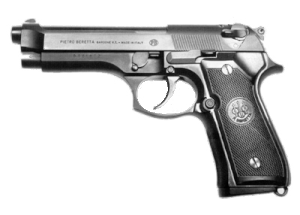Beretta 92FS
| Beretta 92 | |
|---|---|

Beretta 92FS
|
|
| Type | Semi-automatic pistol |
| Place of origin | Italy |
| Service history | |
| In service | 1975–present |
| Used by | See Users |
| Production history | |
| Manufacturer | Fabbrica d'Armi Pietro Beretta |
| Produced | 1975–present |
| Variants | See Variants |
| Specifications | |
| Weight |
|
| Length |
|
| Barrel length |
|
|
|
|
| Cartridge |
|
| Muzzle velocity | 381 m/s (1,250 ft/s) |
| Effective firing range | 50 m (160 ft) |
| Feed system |
Detachable box magazine:
|
Detachable box magazine:
The Beretta 92 (also Beretta 96 and Beretta 98) is a series of semi-automatic pistols designed and manufactured by Beretta of Italy. The model 92 was designed in 1972 and production of many variants in different calibers continues today. The United States Armed Forces replaced the Model 1911A1 .45 ACP pistol in 1985 with the military spec Beretta 92F, the M9.
Beretta currently produces the pistol in four different configurations (FS, G, D and DS) and four calibers: 9×19mm Parabellum, .40 S&W, 9×21mm IMI and 7.65mm Luger.
The Beretta 92 pistol evolved from earlier Beretta designs, most notably the M1923 and M1951. From the M1923 comes the open slide design, while the alloy frame and locking block barrel, originally from Walther P38, were first used in the M1951. The grip angle and the front sight integrated with the slide were also common to earlier Beretta pistols. What were perhaps the Model 92's two most important advanced design features had first appeared on its immediate predecessor, the 1974 .380 caliber Model 84. These improvements both involved the magazine, which featured direct feed; that is, there was no feed ramp between the magazine and the chamber (a Beretta innovation in pistols). In addition, the magazine was a "double-stacked" design, a feature originally introduced in 1935 on the 9mm FN/Browning "Hi-Power".
Carlo Beretta, Giuseppe Mazzetti and Vittorio Valle, all experienced firearms designers, contributed to the final design in 1975.
...
Wikipedia
